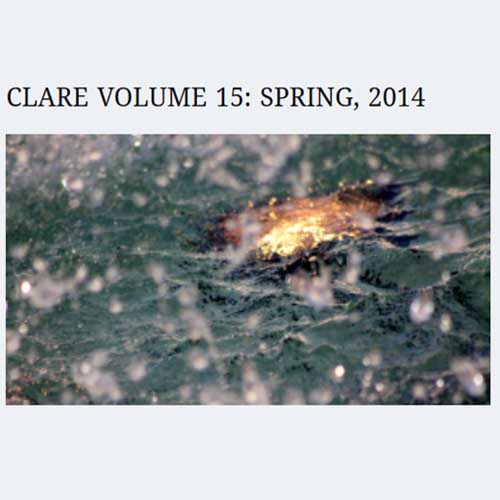Clare Literary Journal – Spring 2014
Clare, a literary journal produced by students and faculty at Cardinal Stritch University in Milwaukee, has recently moved from a print publication to an online endeavor, and this is its second issue in that form. Clare, a literary journal produced by students and faculty at Cardinal Stritch University in Milwaukee, has recently moved from a print publication to an online endeavor, and this is its second issue in that form.
Shannon Fallon contributes the only nonfiction piece, “Blooms,” which reads much like an excerpt from a young adult novel. Capturing a moment when she was sixteen, Fallon writes from a moment of reflection while still showing the naivety of her youth:
The game ended when the grid was filled, but I liked to think that, in theory, the game could last forever. Every row of five or more would disappear, and, if I could just align them fast enough, I could keep it going. If I considered the rules carefully, if I measured all the variables, if I finally discovered just the right strategy, I would never have to lose again.
Rachel Moore’s narrator jumps as the senior diver on a sky diving trip and tests the limits of when to pull the parachute. She uses a foreshadowing illustration that the story itself echoes:
At the jump center, they have this animated poster of Skylar the Diver, who doesn’t deploy his parachute on time. Skylar kicks his legs, suspended in midair, right above a flowery field. They never show you what happens to Skylar though. He is forever balanced between life and death in the bright blue cotton candy sky.
Written in short paragraphs (the one quoted above is the longest in the piece), some only a sentence long, the piece falls down the page, forcing you to read faster and faster as the character falls from the sky.
Dave Patterson’s “Killing Joseph Stalin” was a joy to read in a way you wouldn’t expect from the title. The Joseph Stalin it refers to is actually a rooster that is mean to Emma and “tyrannizes” the hens. Emma goes through an interesting transformation as at the beginning of the story, she is appalled that citizens are encouraged to shoot the wild animals that have escaped from an exotic animal zoo in Maine: “Can’t they stun them and ship them to another zoo?” But later she is so scared of her own rooster that she declares, “I’m going to chop his fucking head off,” and she means it. But one of the exotic animals approaches their yard before she does, and it affects her in a different way. I’ll leave it up to you to read this piece and discover for yourself which animal it could be.
This issue also features sixteen poets that contribute poems that are accessible, with images that are almost tangible. And while each year the publication changes slightly as new student editors step up bringing “new ideas and preferences to the journal,” I can say with certainty that this issue, at least, is worth the read.
[claremagazine.com]





